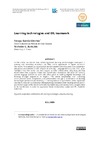Please use this identifier to cite or link to this item:
https://accedacris.ulpgc.es/jspui/handle/10553/70342
| Title: | Learning technologies and EFL teamwork | Authors: | García-Sánchez, M. Soraya Burbules, Nicholas C. |
UNESCO Clasification: | 570107 Lengua y literatura 550510 Filología |
Keywords: | Cooperation Collaboration EFL Learning technologies Ubiquitous learning, et al |
Issue Date: | 2016 | Journal: | LFE. Revista de Lenguas para Fines Específicos | Abstract: | In this article, we discuss how technology-based learning methodologies developed in
primary and secondary education can offer useful approaches to higher education
instruction. For example, young and adult Spanish speakers are often used to participating in
discussions and debates in their English as a Foreign Language (EFL) courses. This paper
highlights how this model can help support a wider collaborative, ubiquitous learning
environment that supports in-class and out-of-class interactions that allow 21st century
second-language learners to work with other peers in building (digital) knowledge and
forming stronger arguments in English. This article emphasizes that mastering
communication skills, cooperation, and collaboration through a combination of learning
technologies are themselves necessary 21st century skills in today’s citizens. These capabilities
can help to establish a continuous lifelong learning orientation when dealing with education
at different stages of life. We will conclude that higher education assessment strategies need
to be transformed in order to appreciate these collaborative, digital and EFL students’
outcomes. En este trabajo se establece que una metodología de aprendizaje sólida que se apoya de la tecnología en educación primaria y secundaria puede ofrecer fórmulas útiles de aprendizaje a los estudiantes de educación superior. Por ejemplo, los jóvenes y adultos españoles están acostumbrados a participar en foros de debate durante sus cursos de Inglés como Lengua Extranjera (ILE). Este trabajo subraya cómo un ambiente de aprendizaje ubicuo que promueve interacción dentro y fuera del aula es el contexto que necesitan estos estudiantes del siglo XXI para trabajar con otros compañeros a través de la creación del conocimiento (digital) y a través de la exposición de argumentos y opiniones en lengua inglesa. Este artículo señala que el desarrollo de las habilidades comunicativas, la cooperación, y la colaboración a través de las tecnologías del aprendizaje son habilidades necesarias para el ciudadano del siglo XXI. Estas habilidades pueden ayudar a establecer una continua orientación de aprendizaje a lo largo de la vida cuando se aborda la educación desde sus distintas etapas. Como consecuencia de ello, concluiremos argumentando que la educación superior necesita también transformar su sistema de evaluación para poder medir estos resultados comunicativos, colaborativos y digitales de los estudiantes de ILE. |
URI: | https://accedacris.ulpgc.es/handle/10553/70342 | ISSN: | 1133-1127 | DOI: | 10.20420/rlfe.2016.0092 | Source: | LFE. Revista de lenguas para fines específicos [eISSN 2340-8561], v. 22 (1), p. 100-115 |
| Appears in Collections: | Artículos |
WEB OF SCIENCETM
Citations
3
checked on Jun 8, 2025
Page view(s)
153
checked on Mar 9, 2024
Download(s)
119
checked on Mar 9, 2024
Google ScholarTM
Check
Altmetric
Share
Export metadata
Items in accedaCRIS are protected by copyright, with all rights reserved, unless otherwise indicated.
